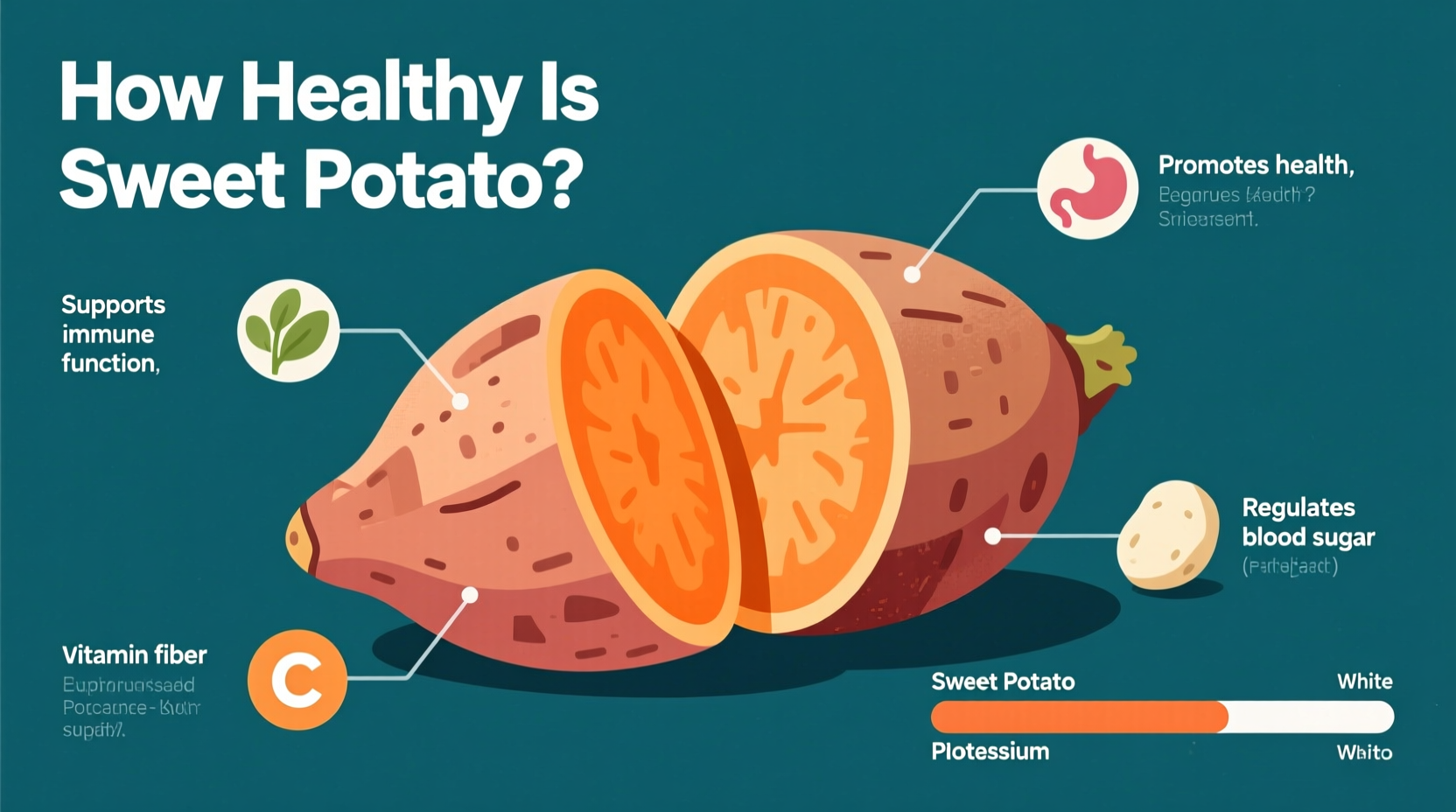The Complete Nutritional Profile of Sweet Potatoes
When evaluating how healthy is sweet potato really is, the numbers speak for themselves. According to USDA FoodData Central, one medium baked sweet potato with skin (146g) contains:
| Nutrient | Amount | % Daily Value |
|---|---|---|
| Calories | 103 | 5% |
| Fiber | 3.8g | 14% |
| Vitamin A (as beta-carotene) | 21,907 IU | 438% |
| Vitamin C | 22.3mg | 25% |
| Potassium | 542mg | 16% |
| Manganese | 0.5mg | 22% |
This impressive nutritional density makes sweet potatoes one of the most nutrient-rich foods you can include in your diet. Unlike regular potatoes, sweet potatoes maintain their nutritional value even when cooked, especially when baked or steamed with the skin on.
Science-Backed Health Benefits of Sweet Potatoes
Research published in the Journal of Medicinal Food confirms that sweet potatoes contain powerful antioxidants like anthocyanins (in purple varieties) and beta-carotene (in orange varieties) that combat oxidative stress. These compounds contribute to several specific health advantages:
Superior Blood Sugar Management
Despite their sweet taste, sweet potatoes have a lower glycemic index (GI) than white potatoes. A study from the National Institutes of Health found that orange-fleshed sweet potatoes had a GI of 44-50, compared to 70-85 for white potatoes. This means they cause a slower, more gradual rise in blood sugar levels, making them a better choice for people managing diabetes or insulin resistance.
Immune System Support
The extraordinary vitamin A content in sweet potatoes plays a crucial role in maintaining healthy mucous membranes in your respiratory, digestive, and urinary tracts—your body's first line of defense against pathogens. Research from the National Institutes of Health Office of Dietary Supplements confirms that vitamin A deficiency impairs immune function and increases susceptibility to infections.
Heart Health Protection
The combination of potassium, fiber, and antioxidants in sweet potatoes contributes to cardiovascular health. Potassium helps regulate blood pressure by counteracting sodium's effects, while fiber helps lower LDL ("bad") cholesterol. A comprehensive review in Nutrients journal linked higher sweet potato consumption with reduced risk of hypertension and cardiovascular disease.

Sweet Potato vs. Regular Potato: A Nutritional Comparison
When considering how healthy is sweet potato compared to its white counterpart, the differences are significant:
- Vitamin A: Sweet potatoes contain massive amounts of beta-carotene (converted to vitamin A), while white potatoes have virtually none
- Glycemic impact: Sweet potatoes generally have a lower glycemic index, causing less dramatic blood sugar spikes
- Antioxidant profile: Sweet potatoes contain unique antioxidants like anthocyanins (purple varieties) and beta-carotene (orange varieties)
- Potassium content: Sweet potatoes typically contain more potassium per serving
However, white potatoes do contain slightly more protein and vitamin C. The key difference lies in how these foods affect blood sugar regulation and their overall antioxidant capacity.
Practical Ways to Maximize Sweet Potato Nutrition
To get the most health benefits from sweet potatoes, preparation matters. Here's how to optimize their nutritional value:
Cooking Methods That Preserve Nutrients
Steaming or baking sweet potatoes with the skin on preserves the maximum amount of nutrients. Boiling can cause water-soluble vitamins like vitamin C to leach into the water. A study published in the Journal of Agricultural and Food Chemistry found that baking preserves up to 92% of beta-carotene, while boiling preserves about 85%.
The Importance of Healthy Fats
Since beta-carotene is fat-soluble, consuming sweet potatoes with a small amount of healthy fat (like olive oil, avocado, or nuts) significantly increases vitamin A absorption. Research from Purdue University demonstrated that adding just 3 grams of fat to a meal containing beta-carotene-rich vegetables increased absorption by 62%.
Variety Selection for Specific Health Goals
- Orange sweet potatoes: Highest in beta-carotene for vision and immune support
- Purple sweet potatoes: Rich in anthocyanins for antioxidant and anti-inflammatory benefits
- White sweet potatoes: Lower in sugar content, potentially better for strict blood sugar management
When Sweet Potatoes Might Not Be Ideal
While sweet potatoes are generally very healthy, there are some considerations:
Portion Control for Blood Sugar Management
Despite their lower glycemic index, sweet potatoes still contain carbohydrates. People with diabetes should monitor portions—typically ½ cup cooked is considered one carbohydrate serving. The American Diabetes Association recommends pairing sweet potatoes with protein and healthy fats to further moderate blood sugar response.
Interaction with Certain Medications
Sweet potatoes are high in vitamin K, which can interfere with blood-thinning medications like warfarin. If you take these medications, maintain consistent sweet potato consumption rather than varying intake significantly from day to day.
Digestive Considerations
The high fiber content in sweet potatoes can cause digestive discomfort for some people, particularly when first increasing fiber intake. Start with smaller portions and increase gradually while drinking adequate water.
Conclusion: Sweet Potatoes as a Nutritional Powerhouse
When evaluating how healthy is sweet potato, the evidence is clear: sweet potatoes are one of the most nutrient-dense foods available. Their exceptional vitamin A content, fiber richness, and diverse antioxidant profile make them a valuable addition to nearly any diet. By choosing appropriate varieties and preparation methods, you can maximize their health benefits while enjoying their naturally sweet flavor. Whether you're looking to boost immunity, support heart health, or simply add more nutrient-rich foods to your plate, sweet potatoes deliver impressive health advantages backed by scientific research.











 浙公网安备
33010002000092号
浙公网安备
33010002000092号 浙B2-20120091-4
浙B2-20120091-4